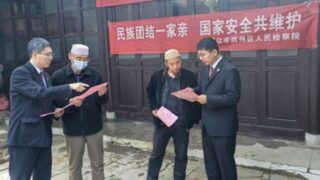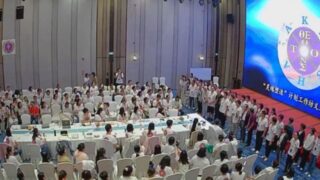On August 12, the People’s Daily called for a nation-wide revival of one of the most dreaded practices of Chairman Mao’s years, accompanied by more propaganda.
by Massimo Introvigne


The People’s Daily, the organ of the CCP’s Central Committee, is publishing an important series of articles on the safety and stability of China’s political system. On August 12, it published the 10th article of the series, reviving an old ghost haunting the Chinese who lived through Chairman Mao’s years and the Cultural Revolution: the Fengqiao Experience (枫桥经验).
The article explained that it is unrealistic to believe that contradictions have disappeared in Chinese society. They do exist, and the method to solve them is the Fengqiao Experience. The article plays on the literal meaning of Fengqiao, “Maple Bridge,” to argue that “Fengqiao is a bridge connecting the hearts of the Party and the people.” And more than a bridge: “a monument to grass-roots governance in the New China,” “a golden brand,” “a winning formula.”
But what is the Fengqiao Experience, and why are the Chinese scared of it? Fengqiao here does not refer to a bridge but to the name of what was in the 1960s a district in Zhuji county, Zhejiang province, and is today a township in the county-level city of Zhuji. In 1963, in what several historians see as the prelude to the Cultural Revolution, Chairman Mao launched the Four Cleanups Movement (四清运动), whose aim was to cleanse politics, economy, organization, and ideology, by identifying and purging “reactionary elements” (四类分子). Four categories of the latter were identified by Mao: landlords, wealthy peasants, “counterrevolutionaries” and “evildoers.” The last two categories included all those who were critical of the CCP or engaged in illegal religious activities.
What happened in Fengqiao was that the “reactionary elements” were dealt with not (more exactly, not only) by the police, but by the “masses themselves,” meaning that activists “rounded up” the enemies and submitted them to public “struggle sessions” in which they were insulted, threatened, and terrorized until they admitted their “crimes.” 3,000 out of 130,000 people in Fengqiao were identified as “reactionary elements” and publicly humiliated. This was a sinister anticipation of what was later generalized in the Cultural Revolution.
Although occasionally mentioned, the Fengqiao Experience, which evoked the nightmares of the Cultural Revolution, was downplayed and almost forgotten until 2013, when Xi Jinping celebrated its 50th anniversary and suggested that its “good example” should be followed again. In 2015, an exhibition hall commemorating the Fengqiao Experience was built in Fengqiao. Xi’s were by no means just celebratory words. Bitter Winter reported repeatedly how Fengqiao-style methods were used in organizing public “struggle sessions” against Christians from house churches, and in inciting “the masses” to spy and report on members of religious movements the CCP regards as illegal, including The Church of Almighty God. Now, the People’s Daily article signals that the system will be implemented nationwide.
It is also important to note that the revival of the Fengqiao Experience is accompanied by a renewed control of the media and a massive effort with propaganda abroad. The eighth article in the People’s Daily series, published on August 8, insisted that, “it is a basic principle of the Marxist concept of news that the Party should control propaganda and the media.” “China is a socialist country under the leadership of the CCP, and no matter how the times develop, and how the media landscape changes, the iron principle of Party control must never change. If the tools of public opinion are not in the hands of the Party and the people, they will not be guided by the will and interests of the Party and the people, and unimaginable harm and misfortune will follow.” ‘The media sponsored by our Party and government must have Party as their last name, remain tightly in the hands of the Party, and become the mouthpiece of the Party and the people. All Party media should adhere to the unity of the Party and the people, fully reflect the Party’s will and ideas, and spread the Party’s voice farther and deeper.”
As far as possible, the article explained, this controls should be extended abroad, conquering the “commanding heights of public opinion” and “overcoming the enemy” with a massive propaganda. Interestingly, a few days before, the Chinese government revealed that the spokespersons of the foreign ministries of China and Russia had held consultations on how to cooperate in joint international propaganda efforts.









